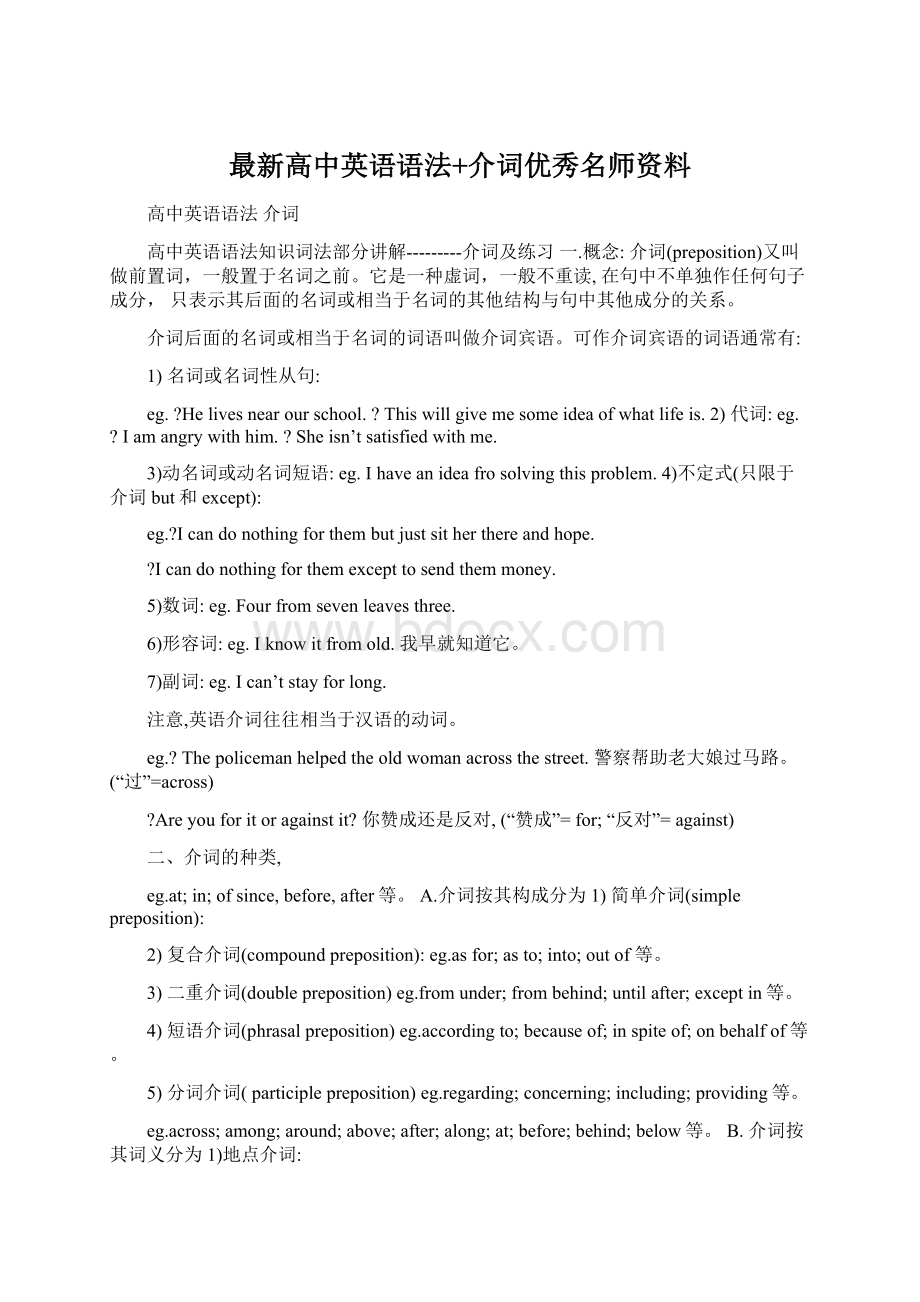最新高中英语语法+介词优秀名师资料.docx
《最新高中英语语法+介词优秀名师资料.docx》由会员分享,可在线阅读,更多相关《最新高中英语语法+介词优秀名师资料.docx(50页珍藏版)》请在冰豆网上搜索。

最新高中英语语法+介词优秀名师资料
高中英语语法介词
高中英语语法知识词法部分讲解---------介词及练习一.概念:
介词(preposition)又叫做前置词,一般置于名词之前。
它是一种虚词,一般不重读,在句中不单独作任何句子成分,只表示其后面的名词或相当于名词的其他结构与句中其他成分的关系。
介词后面的名词或相当于名词的词语叫做介词宾语。
可作介词宾语的词语通常有:
1)名词或名词性从句:
eg.?
Helivesnearourschool.?
Thiswillgivemesomeideaofwhatlifeis.2)代词:
eg.?
Iamangrywithhim.?
Sheisn’tsatisfiedwithme.
3)动名词或动名词短语:
eg.Ihaveanideafrosolvingthisproblem.4)不定式(只限于介词but和except):
eg.?
Icandonothingforthembutjustsitherthereandhope.
?
Icandonothingforthemexcepttosendthemmoney.
5)数词:
eg.Fourfromsevenleavesthree.
6)形容词:
eg.Iknowitfromold.我早就知道它。
7)副词:
eg.Ican’tstayforlong.
注意,英语介词往往相当于汉语的动词。
eg.?
Thepolicemanhelpedtheoldwomanacrossthestreet.警察帮助老大娘过马路。
(“过”=across)
?
Areyouforitoragainstit?
你赞成还是反对,(“赞成”=for;“反对”=against)
二、介词的种类,
eg.at;in;ofsince,before,after等。
A.介词按其构成分为1)简单介词(simplepreposition):
2)复合介词(compoundpreposition):
eg.asfor;asto;into;outof等。
3)二重介词(doublepreposition)eg.fromunder;frombehind;untilafter;exceptin等。
4)短语介词(phrasalpreposition)eg.accordingto;becauseof;inspiteof;onbehalfof等。
5)分词介词(participlepreposition)eg.regarding;concerning;including;providing等。
eg.across;among;around;above;after;along;at;before;behind;below等。
B.介词按其词义分为1)地点介词:
2)时间介词:
eg.about;after;sround;asat;before;behind;between;by;during;for,from..
3)比较介词:
eg.as;like;over;above等。
4)除外介词:
eg.besides;but;except等。
5)反对介词:
eg.against;with等。
6)原因介词:
eg.for;with;from等。
7)结果介词:
eg.for;with;without等。
8)方式介词:
eg.by;in;with等。
9)所属介词:
eg.of;with等。
10)条件介词:
eg.on;without;considering等。
11)让步介词:
eg.inspiteof;despite等。
12)目的介词:
eg.for;to等。
13)根据介词:
eg.on;accordingto等。
三、介词短语及其功用,介词和介词宾语一起构成介词短语(Prepositionalphrase),介词短语在句中可用作:
1)主语:
eg.FromBeijingtoTianjingistwohoursbytrain.2)表语:
eg.Shelookslikeanactress.3)宾语:
eg.I’llgiveyouuntiltomorrow.4)定语:
eg.Afriendinneedisafriendindeed.5)补语:
eg.Theyfoundthemselvesinadarkwood.6)状语:
eg.Alberthassomuchworktodosothatheisstayinglateattheoffice.
四、相关知识点精讲,
1.表示地点位置介词:
1.
1)at,in,on,to:
at:
(1)表示在小地方;
(2)表示"在……附近,旁边";eg.?
Hearrivedatthestationatten.?
Heissittingatthedesk.
(3)表示的位置是某一点;eg.atthethirdcrossroad/at108BeijingStreet/attheNorthPole
(4)可接集体活动。
eg.ataparty/concert/lecture/meeting…athome/atthecornerofthestreet/atthefrontofthehallin:
(1)表示在大地方;
(2)表示"在…范围之内";eg.?
HearrivedinShanghaiyesterday.?
JiangsuliesintheeastofChina.
(3)表示的位置往往是立体的,有长、宽、高等。
?
inthedesk/inthecorneroftheroom/inapicture/inthewallon:
(1)表示毗邻,接壤;
(2)表示的位置往往是一个平面或一条线。
eg.RussialiesonthenorthofChina./acityontheriver/ahotelonthethisroadto表示在……范围外,不强调是否接壤.eg.FujianistothesouthofJiangsuProvince.2)above,over,on:
在……上
above:
(1)指在……上方,不强调是否垂直,与below相eg.?
Thebirdisflyingabovemyhead.
对;两物体中间有一定的空间距离。
?
Therearelightsabove/overourheads.
(2)与刻度连用时,用above。
?
Canyouseetheplaneflyingover/abovethebuilding?
eg.threedegreesabovezero.?
Thewatercameabove/overourknees.over:
(1)指垂直的上方,与under相对,但over与物体eg.?
Thereisabridgeovertheriver.
有一定的空间,不直接接触.eg.?
There’sathickcloudoverthenorthofChina.
(2)表示“布满”,“盖满”?
Thereisatableclothoverthetable.
(3)表示“穿越”,“越过”,用over或acorss。
eg.Hewalkedover/acrossthebridge./Thereisabridgeover/acrosstheriver.
(4)与数字连用时用over=morethan。
eg.over100people/over800metresabovesealevelon:
表示某物体上面并与之接触.eg.Heputhiswatchonthedesk./onthewall3)below,under:
在……下面
under:
(1)表示在…正下方,有垂直之意。
eg.Thereisacatunderthetable.
(2)接普通数词,under=lessthaneg.100metresbelowsealevel/childrenundersevenyearsofage/underfiftybelow:
(1)表示在……下,不一定在正下方eg.Pleasewriteyournamebelowtheline.
(2)与刻度连用时,用below。
eg.tendegreesbelowzero
小测试:
A.inB.atC.onD.into1.Mary’s________thegarden.
A.belowB.onC.aboveD.over2.Don’tworry.She’llfinishtheworkin______twentyminutes.
A.belowusB.belowourselvesC.underusD.underourselves3.Fromthebridgewecouldseetheriver__________.
A.underB.inC.belowD.on4.Theweatherhereis20degrees___________zerotoday.
A.afterbelowB.inbelowC.afterunderD.inunder5.Hewillbeback__________20minutes.
A.onB.overC.throughD.in6.Whentheylookedup,theysawaplane________thetallbuilding.
A.aboveB.belowC.overD.across7.Hefinishedhisworkin_________twentyminutes.
A.onB.inC.atD.to8.Helives____________203HuangheStreet.
2.表示时间介词:
1)in,on,at:
在……时
in:
表示较长时间,如世纪,朝代,时代,年,季节,月及一般(非特指)的早,中,晚等。
theg.inthe20century/inthe1950s/in1989/insummer/inJanuary/inthemorning/inthenight(在夜间)/inone'slife/inone'sthirties等。
on:
表示具体某一天及其早,中,晚。
eg.onMay1st/onMonday/onNewYear'sDay/onacoldnightinJanuary/onafinemorning/onSundayafternoon等。
at:
表示某一时刻或较短暂的时间,或泛指圣诞节,复活节等。
eg.at3:
20/atthistimeofyear/atthebeginningof/attheendof…/attheageof…/atChristmas/atnight/atnoon/atthismoment等。
注意:
在last,next,this,that,some,every等词之前一律不用介词.如:
Wemeeteveryday.
2)in,after:
在……之后
2.
in+段时间"表示将来的一段时间以后;eg.Mymotherwillcomebackinthreeorfourdays.after+段时间"表示过去的一段时间以后;eg.Hearrivedafterfivemonths.after+将来点时间"表示将来的某一时刻以后。
eg.Shewillappearafterfiveo'clockthisafternoon.3)from,since自从……
from:
仅说明什么时候开始,不说明某动作或情况持续多久;eg.Hestudiedthepianofromtheageofthree.sinc:
表示某动作或情况持续至说话时刻,通常与完成时连用。
eg.Theyhavelivedheresince1978.4)after,behind:
在……之后
after:
主要用于表示时间;eg.Weshallleaveafterlunch.behind:
主要用于表示位置.eg.Lucyishidingbehindanoldhouse.5)until/till:
直到„为止。
eg.till/untillastweek/till/untillnow/frommorningtillnight6)by:
在某时间之前;不晚于„„时间。
eg.bytheendoflasyyear
小测试:
A.onB.inC.atD.from1.Weoftengotothepark___________Sundaymorning.
A.afterB.beforeC.tillD.since2.Myaunthasworkedinaclinic___________1949.
A.sinceB.onC.inD.to3.HisfatherwillbebackfromLondon__________afewdays.
A.atB.ofC.onD.with4.Ithappenedtobeverycold_____themorningofoursportsmeet.
A.atB.inC.onD.over5.Hedecidedtovisitthefactory_________Fridaynight.
A.onB.atC.inD.during6.Hesuddenlyreturned__________arainynight.
A.10minuteslaterB.after10minutesC.in10minutesD.10minutesafter7.Thedoctorwillbefree__________.
A.AfterB.InC.FromD.Since8.“Howlonghashisbookshopbeeninbusiness?
”“_______1982.”
A.untilB.afterC.byD.around9.Thetrainleavesat6:
00p.m..SoIhavetobeatthestation________5:
40atthelatest.
A.by;untilB.until;aroundC.till;byD.at;on10.“CanIstay________theweekend?
”
“Yes,butyou’llhavetoleave_________Mondaymiddyatthelatest.”
B.fornineo’clockC.sincetwohoursD.sicnetwohoursago11.Theyhavebeeninthestore__________.A.foralongtimeago
12.Ihavebeenplayingchess________manyyears,butI’mhardlyaexpert.A.inB.withC.sinceD.for
3.表示方式介词:
(1)by:
+接人或方式等。
eg.madebyhim/bythismeanseg.bydoingthis/bycar/bus/train/bike/us/comeinbythedoor
(2)in:
+接语言/衣物等。
eg.inthiswayeg.inthe(this/that)way/inahigh(low)voice/inpen/ink/English/therain(3)with:
+接工具性的名词或其他名词。
eg.withthismethodeg.withahammer/apen(pencil)(4)on:
+接人体名词和TV等词。
eg.lieonone’sback/tolearnEnglishonTV/ontheradio(5)to:
+接乐器或乐曲名词。
eg.tosingtothepiano(guitar)/todancetomusic
3.byfax/radio/telephone:
靠传真、无线电、电话注意,1.byweight(volume):
按重/体积2.byheight:
按高度
4.bytheweek/thehour/theyear按周/按小时/按年5.bythepound按英镑
小测试:
A.inB.withC.byD.on1.Heworkedouttheproblem_________thatmeans.
A.byB.atC.withD.in2.Pleaseanswermyquestion_________aloudenoughvoice.
A.bywhichB.bythatC.inwhichD.withwhich3.Thisisthecar___________hecamehere.
A.with;lookedB.to;lookingC.on;lookingD.on;looked4.Helay_________hisback,hiseyes_________upward.
A.in;withB.with;inC.with;withD.in;in5.Heoftenwrote________apen,butnowheiswriting______pencil.
A.byB.throughC.onD.with6.Hebuiltatelescope____________withhecouldstudytheskies.
A.by;openB.when;openedC.while;openingD.with;open7.Heoftensleeps___________thewindow___________.
A.onB.inC.withD.for8.Howbeautifulthegirllooks___________hernewclothes.
A.byB.fromC.onD.in9.HeoftenlearnsEnglish__________TVafterwrok.
3.
A.bymusicB.bythemusicC.tomusicD.tothemusic10.Theyoftendance_____________onSundaynights.
A.withB.inC.byD.on11.Thetallbuildingwasdestroyed___________abigfire.
A.todanceB.todancebyC.todancewithD.todanceto12.Theyoungmanoftenwritesmusic___________
A.withfaxB.tofaxC.byfaxD.byhefax13.Themanagerkeepsintouchwithme___________.
A.byB.onC.inD.through14.Hewascaught__________theheavyrain.
4.表示除外介词:
除外介词有:
besides;but;except和apartfrom。
(1)besides:
除外„„之外(还包括„„)。
eg.Weneedfifteenmorepeoplebesidesyourgroup.
besides+doingsth.eg.Whatelsedidyoudobesideswritingaletter?
eg.Idon’treallywanttogo.Besides,it’stoolatenow.注意:
?
besides:
adv.而且,再说
eg.Sheissittingbesidemeonthebench.?
beside:
prep.在„„之旁。
(2)except/but:
除„„之外(不包括)。
eg.Weworkeverydayexcept/butSaturdayandSunday.exceptfor+sth.:
除去整体的一部分或对部分缺点要修正。
eg.?
Exceptforthecolor,Ilikethecarverymuch.
eg.?
Yourcompositionisgoodexceptforsomespellingmistakes.exceptthat+从句:
eg.WeknownothingabouthimexceptthatheisAmerica.exceptwhen+从句:
eg.Hecomestoseemeeverydayexceptwhenitrains.except/but+todosth.eg.?
Ihavenothingelsetodoexcep